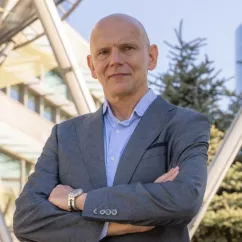Does Digital Transformation Mean Turning Your Employees Into Robots?

Grzegorz Galusek is Executive Director of the Poland-based Microfinance Centre (MFC), an international network of 110 institutions in Europe and Central Asia. Grzegorz is a microfinance specialist with significant field experience gained at Fundusz Mikro, a microfinance institution based in Poland. As MFC director, Grzegorz has designed international and country-specific educational and access to finance programs which address the needs for financial and non-financial services among low-income people and micro-entrepreneurs in Europe and Central Asia.
FinDev: This year’s MFC Annual Conference is entitled “Demystifying Digital in Microfinance.” Can you tell us how you chose this topic, and why you feel that digital needs to be demystified?
Grzegorz: We think there is a problem of limited availability of practical tools or guides to approach digitalization in microfinance. When microfinance managers think “digitalization” they often have in mind this extraordinary effort to totally revamp their institutions with the use of open APIs, the cloud, blockchain, artificial intelligence (AI), big data or any other high technology available.
While this is not necessarily untrue, there is a way of approaching digital innovation incrementally, starting from simple improvements, for instance equipping loan officers with tablets, using social media for marketing, or eliminating paperwork by digitizing records. Many European and Central Asian institutions have already taken such steps without recognizing that they are already on the digital path. During the MFC Annual Conference 2019, we would like to break down the idea of “digital” into a number of practical steps that lead to a more complete digital transformation of MFIs.
FinDev: One of the conference sessions focuses on the importance of workforce transformation in order to achieve digital transformation. What are the new human resources needs when going digital? Do we need to transform our workforce into robots?
Grzegorz: It is crucial to understand how digitalization affects the workforce. The big question, of course, is whether it will lead to job losses, as many academics and journalists caution it will. So far, at least in microfinance, we have not witnessed any symptoms of this trend.
For example, in the case of Qredits, a Dutch MFI which is now almost fully digitalized, the gradual transformation has not cost any jobs. On the contrary, significant outreach and efficiency gains as a result of the digitalization process actually allowed for a small employment increase. As another example, ADIE, an MFC member operating in France, recently introduced a chat bot that substituted their previous, less effective client acquisition channels. This change has not resulted in any job losses, but similar to the case of Qredits, may end up creating new job opportunities.
In the context of potential job losses, an even more important concern is whether the institutions themselves will survive the onslaught of new technology-based, digital, decentralized and democratized financial services. Tomorrow belongs to those who understand the change that is happening and can take advantage of available technologies. This requires skills and competencies that many microfinance institutions do not have. For instance MFI staff often think that it is ultimately up to the IT unit to take responsibility for all aspects of going digital. However, most MFI staff will have to re-skill in areas such as digital marketing, data analysis and digital product development. The skills gap should be addressed through wise HR policies and skills development programs.
It is also critical that there is a talented and proactive leadership capable of managing the transformation process and keeping an eye on the developments and opportunities.
Tomorrow belongs to those who understand the change that is happening and can take advantage of available technologies.
FinDev: Another conference session delves into the concept of “agile working.” What is this and how is it relevant to financial inclusion?
Grzegorz: The agile working method comes from IT and was developed to respond to the unpredictability associated with developing new software. It is a way of managing projects that allows for small project teams to design tasks that are implemented incrementally. Usually, teams use the so-called Scrum methodology, breaking work into actions that can be completed within specific time periods, typically around two weeks long, and then tracking progress and making adjustments as needed. This methodology offers greater flexibility than traditional project management techniques and tends to result in better team dynamics and higher productivity.
The agile working method can be used in virtually any operational unit, from marketing to human resource management to new product development. We think that this way of managing projects and working together should be of special interest to the MFIs, in particular those that are on the digital transformation path. At the conference in Istanbul, we will unpack “agile” - so that MFI managers can better understand why it can be beneficial and how it works.
FinDev: What else can we look forward to? What are you most excited for at this year’s conference?
Grzegorz: I think Tim Ogden’s keynote speech will be one of the most exciting conference highlights. Tim is managing director of the Financial Access Initiative at New York University. He has co-authored and edited many books on business innovation and marketing and is the author of Experimental Conversations, a collection of interviews with economists conducting field experiments on poverty alleviation. In his keynote, Tim will focus on the current, rather dramatic trends in technology-backed finance and the next frontiers in financial inclusion.
Another important highlight: we are putting together a Fintech Pitch Session and Marketplace that will be combined with a Social Investors Fair. We have invited and carefully selected a number of fintechs that focus on financial inclusion so that traditional microfinance participants can interact with them and learn about the next wave of break-throughs that will shake up our lives and shape the future. These events have been organized in collaboration with the MetLife Foundation and the European Union support program for microfinance (EaSI TA).
FinDev: What do you hope that participants will get out of attending the MFC Conference in May?
Grzegorz: I expect that practitioners will be inspired by what their peers have already achieved, and that they will gain practical knowledge to support them in moving forward with digital transformation. I also hope that all participants can leave Istanbul with the feeling that they can be part of this exciting technological change that is happening all over the world.


